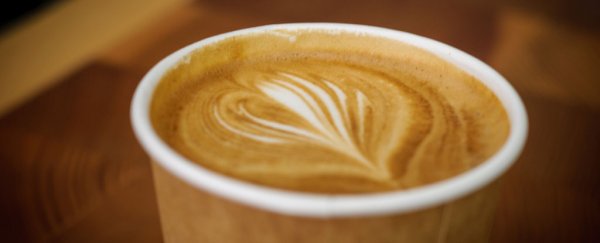It's no secret that everybody's coffee drinking habits are different. Some people can't seem get to enough (that would be me), while others limit themselves to a single cup a day, or none at all.
And now scientists might finally have a way to explain your relationship with coffee, finding that genetic variations that affect how the body breaks down caffeine could be responsible for influencing us to drink more or less of this stimulating beverage.
Researchers led by the University of Edinburgh in the UK found that people with a DNA variation in a gene called PDSS2 tend to drink fewer cups of coffee than those without the variation.
The thinking goes that the gene variation slows down the body's processing of caffeine, inducing those with the variant to drink less, because they're perfectly-buzzy-already-thank you.
"The hypothesis is that people with higher levels of this gene are metabolising caffeine slower, and that's why they're drinking less coffee," geneticist Nicola Pirastu told Alexandra Sifferlin at Time. "They need to drink it less often to still have the positive effects of caffeine, like being awake and feeling less tired."
The researchers examined the genetic makeup of 370 people living in a small village in south Italy, and compared it with the DNA of 843 people from villages in the country's north-east. In addition to being genotyped, the participants completed a survey that included a question about how much coffee they drank each day.
The team found that those with the PDSS2 variation drank on average about one cup fewer daily.
When the scientists replicated the trial with a sample of 1,731 people in the Netherlands, they found a similar result. Participants with the DNA variation drank less coffee, although the difference – measured in number of cups consumed – was less this time.
The researchers attribute this gap between the Italian and Dutch consumption to the countries' different coffee serving sizes: in Italy people take their coffee in small cups, whereas the Dutch prefer large servings that generally contain more caffeine.
"I think that this study reinforces the idea that genetics play a very important role in our everyday habits and lifestyles and understanding this is helping us not only know how people behave but also why, which will allow us to understand how to act on them," Pirastu told Sarah Knapton at The Telegraph.
"In this specific case it seems to reinforce the idea that caffeine is probably the main biological driver of coffee consumption."
While the team says they've only found an association at this point, this isn't the first time researchers have found a link between how much coffee we drink and our genetic code.
A much larger study conducted in 2014 looked at the DNA of more than 120,000 people, and found that gene variants influenced people to moderate their coffee intake based on how efficiently their metabolism processed caffeine, so as to get the optimal effects from the drink.
Further research will be required to verify the findings, but the more we find out about the ties between coffee and our DNA, the better – especially since it could be important for our health.
"The results of our study add to existing research suggesting that our drive to drink coffee may be embedded in our genes," Pirastu said. "We need to do larger studies to confirm the discovery and also to clarify the biological link between PDSS2 and coffee consumption."
The findings are reported in Scientific Reports.
